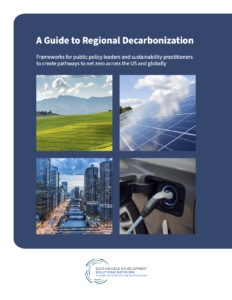A Guide to Regional Decarbonization
Frameworks for public policy leaders and sustainability practitioners to create pathways to net zero across the US and globally
Overview of the Guide to Regional Decarbonization
As cities, states, and countries across the world continue to commit to reducing their emissions, accelerating and supporting decarbonization planning and implementation processes requires that jurisdictions share learned lessons comprehensively and intentionally. By presenting a clear vision of feasible decarbonization pathways for coordination among governments and sectors in the region of San Diego, California, the 2022 San Diego Regional Decarbonization Framework (RDF) can help inform the establishment of other such roadmaps across the US and globally. The Sustainable Development Solutions Network (SDSN) has developed an accompanying Guide to the RDF to serve as a toolkit for other jurisdictions to follow in their own pursuit of decarbonization.
The Guide distills the high-level process undertaken so far by the County, highlights the enabling factors for success, and provides a step-by-step instruction manual for other communities that wish to undertake similar long-term planning processes in their efforts to combat climate change. The Guide aims to share the process undertaken by San Diego County to help equip researchers, scientists, and political leaders across the US and beyond with the resources they need to advance science-based pathways to regional decarbonization during this decisive Decade of Action.
Decarbonization Resource Directory
As an appendix to the Guide to Regional Decarbonization, this directory provides a wide array of examples of open-source resources that can support the creation of regional decarbonization frameworks and the development of decarbonization policies at various scales.
The resources are classified according to the following categories:
(1) Tools are individual instruments used to collect, measure, and analyze data (e.g., geospatial maps, policy trackers, and data models)
(2) Databases/Resource Hubs are collections of multiple tools and relevant datasets
(3) Case Studies/Reports are written documents that present the findings of specific research investigations.
The resources in the directory were collated following a rigorous selection process in which only peer-reviewed and the latest available versions were considered. Resources were selected based on their applicability in both the US and abroad, including the Case Studies/Reports whose findings can be used to inform efforts beyond their areas of study. The resources were identified via a standard desktop review, citations in the San Diego Regional Decarbonization Framework chapter bibliographies, suggestions from the San Diego Regional Decarbonization Framework project team, the San Diego Regional Decarbonization Framework sector workshop audiences, and a selection of decarbonization experts from SDSN’s global network of knowledge institutions.
Although some of the resources were designed to be used by specific stakeholder groups (e.g., government policymakers, financing institutions, and infrastructure developers), the majority are user-friendly and designed for use by wider audiences (e.g., academics, consultants, homeowners, and utilities, among others). Moreover, this list is only representative and not exhaustive. If you would like to contribute to this directory, please reach out to [email protected] with additional resources.
Instructions for Use
The directory categorizes each resource by Type, Scope, and Theme. Use the filter and sort options in the top left corner of the panel below to narrow your search. Access the resource directory via a desktop for best use of filtering and sorting mechanisms. Click on each resource to expand the full details. For a larger view of the entire directory, use the expansion option in the bottom right corner of the panel.
Filter and Sort Options:
Type
- Tool: Individual instruments used to collect, measure, and analyze data (e.g., geospatial maps, policy trackers, and data models),
- Database/Resource Hub: Collection of multiple tools and relevant datasets
- Case Study/Report: Written documents that present the findings of specific research investigations
Scope
- Local: Resource focuses on the local level (e.g., cities, counties, municipalities, etc.),
- State (US): Resource focuses on US state level (e.g., California, Florida, etc.),
- National (US): Resource focuses on US national level (i.e., it focuses on the entire country),
- International: Resource focuses on more than one country
Theme
- Buildings, Cities, Economics, Employment, Energy, Geospatial, Implementation, Industry, Justice, Land Use, Mapping, Modeling, Pathways, Planning, Policy, Sustainable Materials Management, Technology, Transportation


